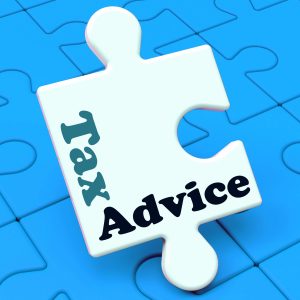Tap your CPA’s knowledge and experience
As your business grows so do the complexities of complying with the regulations and requirements that may apply to you and your business. Your accountant is available to assist with accounting and compliance issues. In a business environment where these rules and regulations are constantly changing you want to be sure you are covered. Make sure you keep the lines of communication open throughout the year and take advantage of all the knowledge and expertise your accountant has to offer. The added value from keeping in touch with your accountant could extend well beyond tax services.
How is your business actually doing?
 If you are familiar with basic accounting and maintain your own set of books, but can’t seem to make sense of the reports your accounting software is producing it may be time to sit down with your accountant. This is a great way to analyze how your business is actually doing. Your accountant is well versed in what your cash flow and finances are comprised of and could be an extremely useful resource when it comes to planning your future, setting goals, and assuring growth.
If you are familiar with basic accounting and maintain your own set of books, but can’t seem to make sense of the reports your accounting software is producing it may be time to sit down with your accountant. This is a great way to analyze how your business is actually doing. Your accountant is well versed in what your cash flow and finances are comprised of and could be an extremely useful resource when it comes to planning your future, setting goals, and assuring growth.
Consider outsourcing your bookkeeping
Success and growth may mean that more time and focus is needed with daily operations. The accounting and tax rules and regulations that become applicable are also more complicated than what you may have seen in the past. Allowing your accountant to take charge of the bookkeeping tasks allows you to focus on managing your business and creates a relationship where there is constant communication.
Together, you can develop a strategic plan for the future while discussing aspects of your business that may need change or attention. The conversations and accuracy of the financial reports will provide you with an accurate understanding of your businesses profitability and allow for accurate projections to be made which results in an easier tax filing season.
Ask questions
You should be asking your CPA questions about the financial aspects of your business that you may not be familiar with and would like to learn more about. These conversations can lead to you feeling more comfortable and confident while making informed decisions to assure a successful business.
Stay in touch
Your accountant can offer the proper guidance needed to make you consider all possible outcomes, consequences, or opportunities that may arise when making business decisions. Keeping them informed about any significant changes is imperative to avoid negative repercussions when it comes to accounting or compliance issues. Be sure to stay proactive in keeping your accountant apprised of decisions regarding your personal finances, business engagements, and any other significant changes in your life. With expertise in many different areas, your accountant can offer you insight and support even after you’ve filed your tax return.
Additional resources
If you haven’t yet found the CPA that’s right for you, check out the post, “How to Choose the Right Accountants.” The post, “Does Your Small Business Need Help with Bookkeeping Tasks” can help you decide if outsourcing these important tasks is right for your small or mid-size business.






 Self-rental is an arrangement in which a business and property that it rents are both owned by the same person(s). It is common for a taxpayer to own an operating business and also own the accompanying real estate. That person has to materially participate in the operating company for the self rental rules to apply. If the operating company is an entity that the owner(s) actively participate in on a day-to-day basis, in most cases the owner(s) would be considered to materially participate in that activity.
Self-rental is an arrangement in which a business and property that it rents are both owned by the same person(s). It is common for a taxpayer to own an operating business and also own the accompanying real estate. That person has to materially participate in the operating company for the self rental rules to apply. If the operating company is an entity that the owner(s) actively participate in on a day-to-day basis, in most cases the owner(s) would be considered to materially participate in that activity. As evident from these questions, the thing to focus on is the future. Although the seller will certainly focus on past performance, what happened twenty, ten, or five years ago is of little significance; you want to know what will happen in the future.
As evident from these questions, the thing to focus on is the future. Although the seller will certainly focus on past performance, what happened twenty, ten, or five years ago is of little significance; you want to know what will happen in the future. Depending upon the version purchased, these packages will offer the user the ability to perform basic bookkeeping functions such as
Depending upon the version purchased, these packages will offer the user the ability to perform basic bookkeeping functions such as A real estate professional who is involved in buying real estate with the intention of selling for a profit in a short time frame, or flipping is usually considered a dealer. Contractors and builders who build houses and commercial structures, and subsequently sell the finished property to customers are also considered dealers.
A real estate professional who is involved in buying real estate with the intention of selling for a profit in a short time frame, or flipping is usually considered a dealer. Contractors and builders who build houses and commercial structures, and subsequently sell the finished property to customers are also considered dealers. In a business sale, the seller prefers to sell the stock representing the business ownership, but the buyer prefers to purchase the assets of the corporation. The seller wants a stock sale because it generates a capital gain, taxed at a 20% rate. The buyer prefers to purchase the assets because the full purchase price is allocated to the assets purchased, creating tax deductions for depreciation and amortization. In a stock purchase, the buyer steps into the seller’s shoes, receiving no tax benefit from the price paid until the business is sold. This issue is usually resolved by compromise, sometimes involving a price adjustment.
In a business sale, the seller prefers to sell the stock representing the business ownership, but the buyer prefers to purchase the assets of the corporation. The seller wants a stock sale because it generates a capital gain, taxed at a 20% rate. The buyer prefers to purchase the assets because the full purchase price is allocated to the assets purchased, creating tax deductions for depreciation and amortization. In a stock purchase, the buyer steps into the seller’s shoes, receiving no tax benefit from the price paid until the business is sold. This issue is usually resolved by compromise, sometimes involving a price adjustment.